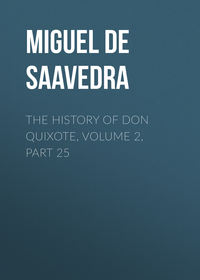Książki nie można pobrać jako pliku, ale można ją czytać w naszej aplikacji lub online na stronie.
Czytaj książkę: «The History of Don Quixote, Volume 2, Part 25»
CHAPTER XXII.
WHERIN IS RELATED THE GRAND ADVENTURE OF THE CAVE OF MONTESINOS IN THE HEART OF LA MANCHA, WHICH THE VALIANT DON QUIXOTE BROUGHT TO A HAPPY TERMINATION
Many and great were the attentions shown to Don Quixote by the newly married couple, who felt themselves under an obligation to him for coming forward in defence of their cause; and they exalted his wisdom to the same level with his courage, rating him as a Cid in arms, and a Cicero in eloquence. Worthy Sancho enjoyed himself for three days at the expense of the pair, from whom they learned that the sham wound was not a scheme arranged with the fair Quiteria, but a device of Basilio's, who counted on exactly the result they had seen; he confessed, it is true, that he had confided his idea to some of his friends, so that at the proper time they might aid him in his purpose and insure the success of the deception.
"That," said Don Quixote, "is not and ought not to be called deception which aims at virtuous ends;" and the marriage of lovers he maintained to be a most excellent end, reminding them, however, that love has no greater enemy than hunger and constant want; for love is all gaiety, enjoyment, and happiness, especially when the lover is in the possession of the object of his love, and poverty and want are the declared enemies of all these; which he said to urge Senor Basilio to abandon the practice of those accomplishments he was skilled in, for though they brought him fame, they brought him no money, and apply himself to the acquisition of wealth by legitimate industry, which will never fail those who are prudent and persevering. The poor man who is a man of honour (if indeed a poor man can be a man of honour) has a jewel when he has a fair wife, and if she is taken from him, his honour is taken from him and slain. The fair woman who is a woman of honour, and whose husband is poor, deserves to be crowned with the laurels and crowns of victory and triumph. Beauty by itself attracts the desires of all who behold it, and the royal eagles and birds of towering flight stoop on it as on a dainty lure; but if beauty be accompanied by want and penury, then the ravens and the kites and other birds of prey assail it, and she who stands firm against such attacks well deserves to be called the crown of her husband. "Remember, O prudent Basilio," added Don Quixote, "it was the opinion of a certain sage, I know not whom, that there was not more than one good woman in the whole world; and his advice was that each one should think and believe that this one good woman was his own wife, and in this way he would live happy. I myself am not married, nor, so far, has it ever entered my thoughts to be so; nevertheless I would venture to give advice to anyone who might ask it, as to the mode in which he should seek a wife such as he would be content to marry. The first thing I would recommend him, would be to look to good name rather than to wealth, for a good woman does not win a good name merely by being good, but by letting it be seen that she is so, and open looseness and freedom do much more damage to a woman's honour than secret depravity. If you take a good woman into your house it will be an easy matter to keep her good, and even to make her still better; but if you take a bad one you will find it hard work to mend her, for it is no very easy matter to pass from one extreme to another. I do not say it is impossible, but I look upon it as difficult."
